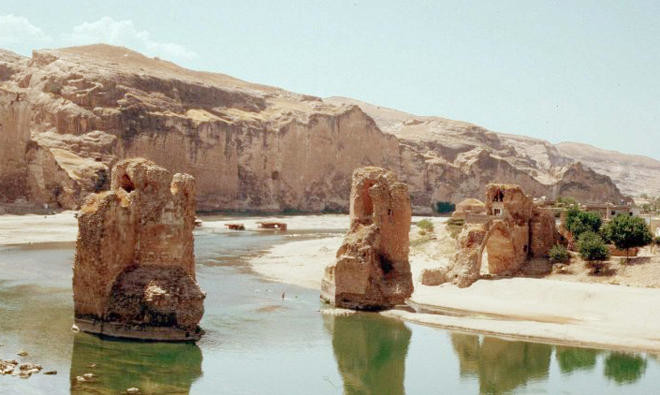BAGHDAD: Iraq has been negotiating with Turkey and Iran to minimize the effects of the two countries’ water policies on its territories, Iraqi Deputy Minister of Water Resources Mahdi Rasheed told Arab News on Wednesday.
Rasheed said that the talks were aimed at finding common solutions to an expected water crisis in the summer.
Iraq mainly relies on the Tigris and Euphrates rivers and rainwater to provide its fresh water needs. Both rivers originate from outside Iraq, and Turkey, Iran and Syria have controlled the release of water into Iraq for decades.
A decline in rainfall during the past two months, increasing rates of evaporation caused by high temperatures and a lack of water imports from Turkey and Iran, mean Iraq’s southern provinces have been suffering a serious shortage of water.
The crisis is expected to worsen after the completion of the Alesso dam and Turkey’s announcement of its intention to fill the dam’s reservoirs in March.
Iraq last week filed a formal request to Turkey to postpone the filling of the Alesso dam from March to June to help Iraq “overcome the period of water scarcity.”
“The water shortage crisis still exists. If Turkey insists on filling the reservoirs of the (Allesso) dam in March, we will certainly be hurt,” Rasheed said. “We will have to rely on our water reservoirs to secure the demands of agriculture and drinking water. As a ministry we are thinking about the future; it is not logical to empty our (water) reservoir.”
Iraq is seeking to benefit from the season of melting of snow, which begins in March, to replenish its water reservoirs. Iraqi officials involved in the talks with Turkey have presented an alternative plan for the Turkish side to fill the reservoirs without depriving Iraq of water during March to June.
According to the suggested Iraqi plan, the filling period of the Turkish dam would last for a maximum of four years and minimum of seven months, depending on rainfall.
“The Turkish side understands our problem,” said Rasheed, who heads the Iraqi delegation negotiating with the Kurdish side on the joint water issues.
“We recognize their right to fill the dam but we have a problem. We agree that the dam will help us to control the water release and organize water policy, but the problem is their (the Turkish) plan to fill it (the dam),” he said.
“We are still waiting for their response to our request and we expect that they will answer us next week.”
Rasheed said that Iraq is facing similar problems with Iran, which has cut the water imports of the Tigris river from 40 percent to 15 percent due to the projects and dams that Iran has established on the river during the past years.
The almost-completed Daryan dam, which Iran is building on the Tigris river, 28 km away from the Iraqi-Iranian border, and the 47 km-long tunnel it has dug near it to divert the river into Iran, is the biggest concern for Iraqi officials.
“Iran is trying to divert the course of the (Tigris) river. In this case even the (amount) that we receive now will be cut and will not reach us,” Rasheed said.


Iran-Turkey water policy leaves Iraq dry
Iran-Turkey water policy leaves Iraq dry

US kills Al-Qaeda affiliate leader tied to December attack in Syria, Centcom says

- Bilal Hasan Al-Jasim had “direct ties” to a Daesh gunman who killed and injured US and Syrian personnel
WASHINGTON: US military forces on Friday killed an Al-Qaeda affiliate leader linked to a Daesh attack on Americans in Syria last month, US Central Command said in a statement on Saturday.
Bilal Hasan Al-Jasim had “direct ties” to a Daesh gunman who killed and injured US and Syrian personnel on December 13 in Palmyra, Syria, Central Command said.
“The death of a terrorist operative linked to the deaths of three Americans demonstrates our resolve in pursuing terrorists who attack our forces,” said Admiral Brad Cooper, the head of US Central Command, in a statement.
Since the December 13 attack, US forces have been conducting strikes in Syria, with the US military saying it has hit more than 100 Daesh targets.
© 2026 SAUDI RESEARCH & PUBLISHING COMPANY, All Rights Reserved And subject to Terms of Use Agreement.













